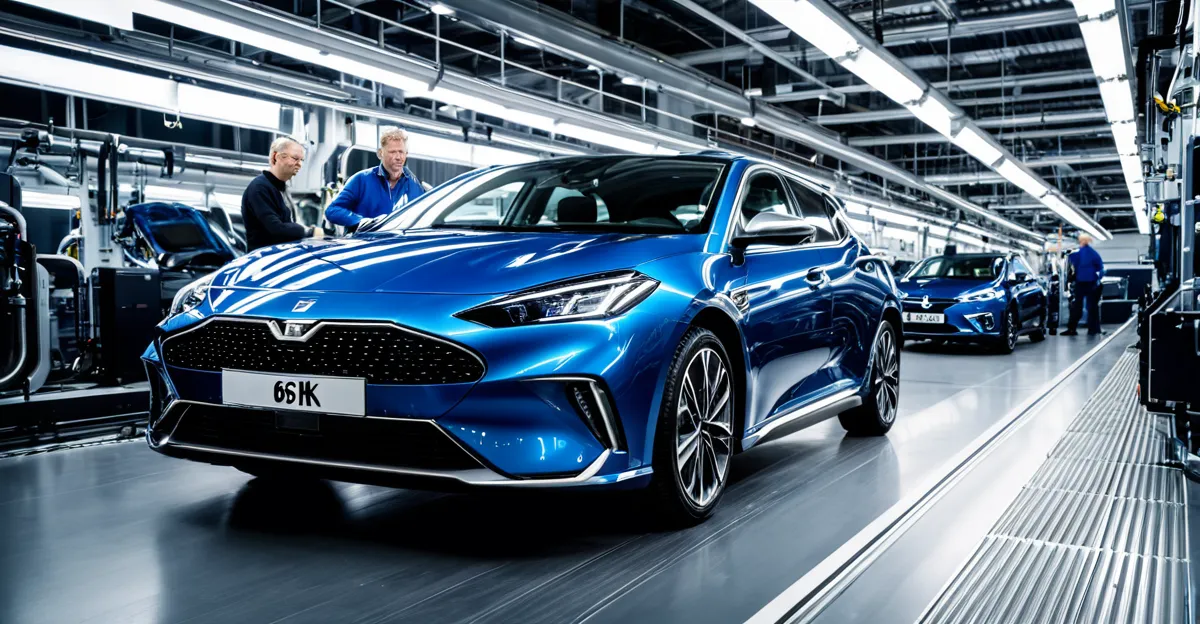Leading renewable energy strategies in UK car manufacturing
The UK automotive sustainability landscape is rapidly transforming with the integration of diverse renewable energy strategies. Major manufacturers have embraced sources such as solar, wind, and biomass to power production facilities. Solar power installations are common on factory rooftops, providing clean energy directly to manufacturing lines. Wind energy, both on-site turbines and purchased from renewable grids, supplements factory operations with a steady, sustainable supply. Biomass, though less widespread, serves as an alternative energy source in some plants, particularly where waste materials can be repurposed efficiently.
UK car manufacturers adopt a multi-faceted approach to renewable energy integration. Some rely on direct power purchase agreements (PPAs) with green energy suppliers, ensuring a consistent renewable supply without the need for extensive on-site infrastructure. Others invest in on-site renewable generation paired with energy storage systems to manage fluctuating demands. This hybrid strategy enhances energy security while reducing carbon footprints.
Also read : How Will the Latest Technological Innovations Drive Change in the UK Automotive Industry?
Recent statistics show a significant uptake in renewable integration across the sector. Over 65% of UK automotive factories have incorporated at least one form of renewable energy, with annual growth rates exceeding 10% in solar and wind capacity. This steady increase marks a shift toward greener, more sustainable automotive manufacturing across the UK.
Case studies of UK car makers implementing renewable energy
A prime example of Jaguar Land Rover renewable energy efforts is their extensive use of solar panels and wind turbines at production sites. This commitment reflects the company’s aim to harness multiple renewable energy sources, reducing reliance on fossil fuels. Solar arrays generate significant electricity during daylight hours, while nearby wind facilities contribute power around the clock, facilitating a balanced renewable energy integration.
Also read : What Are the Most Environmentally Friendly Innovations in the UK Automotive Industry?
The Nissan Sunderland plant stands out for its ambitious transition toward near-complete renewable power usage. Nissan integrates on-site solar installations alongside purchases of green energy, dramatically cutting its carbon footprint. This dual approach illustrates how large manufacturers combine different renewable energy strategies to optimize sustainability while maintaining production efficiency.
Other notable UK car makers sustainability programs include bioenergy utilization and energy storage trials, further demonstrating industry-wide dedication. These projects not only reduce operational emissions but also promote long-term energy resilience. Collectively, these case studies highlight the practical benefits and scalability of renewable energy integration within the UK automotive sector.
Integration methods within production processes
UK automotive factories employ a combination of direct power purchase agreements (PPAs) and on-site renewable energy generation to enhance sustainability. PPAs allow manufacturers to secure a consistent supply of green energy without the need for extensive infrastructure, directly supporting renewable energy integration. Simultaneously, many factories invest in solar panels and wind turbines on-site, which helps reduce reliance on the grid and lowers operational emissions.
Energy storage solutions and smart grid technology are increasingly pivotal in managing energy supply and demand within production processes. These systems store excess renewable energy generated during peak times for use during off-peak hours, ensuring consistent factory operation and optimizing energy efficiency. This approach addresses variability in renewable production, such as solar intermittency, and enhances the resilience of factory energy systems.
Retrofitting existing manufacturing infrastructure also plays a critical role. Upgrading older facilities to accommodate renewable energy systems — including installing energy-efficient machinery and integrating automation for better energy management — supports manufacturers’ renewable energy strategies without halting production. Collectively, these integration methods demonstrate the UK automotive sector’s commitment to embedding sustainability deeply into factory operations.
Environmental impact and benefits
The push for renewable energy integration in UK automotive manufacturing has led to significant carbon emissions reduction. Factories utilizing solar, wind, and biomass energy sources report measurable decreases in greenhouse gas emissions, helping the sector move closer to its net-zero targets. These reductions are critical, as the automotive industry traditionally accounted for a substantial share of energy-related emissions.
Green manufacturing initiatives also improve local air and water quality. By replacing fossil fuel power with cleaner alternatives, factories emit fewer pollutants, benefiting surrounding communities. Reduced particulate matter and lower nitrogen oxide levels foster healthier environments, which support both public health and biodiversity.
Importantly, these environmental gains contribute directly to broader UK climate targets. The automotive sector’s commitment to renewable energy strategies helps fulfill national goals set under the UK’s legally binding carbon budgets. As more factories adopt renewables and refine energy efficiency measures, their cumulative impact supports sustainable industrial growth alongside environmental stewardship.
Ultimately, this blend of renewables and eco-conscious policies positions UK car manufacturing as a vital contributor to the country’s green transition, demonstrating that industrial progress and environmental care can move hand in hand.
Industry trends and future initiatives
The future of UK car manufacturing is increasingly shaped by evolving automotive sustainability trends and strengthened policy frameworks. Recent legislative drivers, such as stricter carbon reduction targets and incentives for clean energy adoption, are accelerating renewable energy integration in the sector. These policies encourage manufacturers to deepen collaboration with renewable energy providers, fostering innovative solutions for clean power supply.
Manufacturers anticipate more widespread use of green hydrogen and advanced energy storage technologies, supporting 24/7 renewable operation. Industry-wide commitments, including net-zero pledges, signal a coordinated push toward sustainable manufacturing. Partnerships between car makers and energy firms are developing, enabling tailored renewable contracts and co-investment in infrastructure.
Forthcoming projects showcase automation and digitalization to optimize factory energy consumption, aligning renewable energy strategies with operational efficiency. This ongoing evolution reflects how UK automotive sustainability is transitioning from individual initiatives to systemic, long-term transformation. The combination of policy impetus, technological advancement, and collaborative models promises a resilient, low-carbon future for the UK automotive sector.











